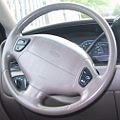2000 Ford Windstar Owner Guide 1st Printing - Page 133
2000 Ford Windstar Manual
Page 133 highlights
Seating and safety restraints Each seating position in your vehicle has a specific safety belt assembly which is made up of one buckle and one tongue that are designed to be used as a pair. 1) Use the shoulder belt on the outside shoulder only. Never wear the shoulder belt under the arm. 2) Never swing the safety belt around your neck over the inside shoulder. 3) Never use a single belt for more than one person. While you are fastened in the seat belt, the combination lap/shoulder belt with a cinch tongue adjusts to your movement. However, if you brake hard, turn hard, or if your vehicle receives an impact of 8 km/h (5 mph) or more, the safety belt will become locked and help reduce your forward movement. Energy Management Feature • This vehicle has a seat belt system with an energy management feature at the driver seating position and second row bench seat belt assemblies adjacent to a sliding door to help further reduce the risk of injury in the event of a head-on collision. • This seat belt system has a retractor assembly that is designed to pay out webbing in a controlled manner. This feature is designed to help reduce the belt force acting on the occupant's chest. Failure to replace the Belt and Retractor assembly could increase the risk of injury in collisions. 133
















